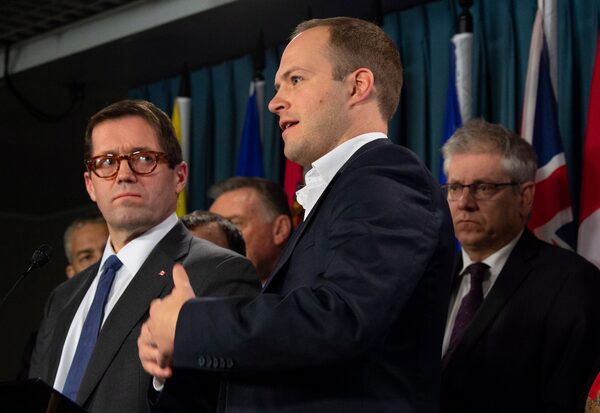
Standing Committee on Access to Information, Privacy and Ethics Chair Bob Zimmer, left, and Deputy-Chair Charlie Angus, right, look on as deputy-chair Nathaniel Erskine-Smith speaks during a news conference in Ottawa, on Dec. 11, 2018.Adrian Wyld/The Canadian Press
A parliamentary committee is calling on the government to step in and regulate internet giants such as Facebook Inc. and Alphabet Inc. in order to block hate speech, limit unwanted surveillance and protect Canadian elections from fake news and foreign interference.
The House of Commons committee on access to information, privacy and ethics released its final report on Tuesday after an in-depth investigation into the Cambridge Analytica scandal, which saw the Britain-based political consulting firm obtain personal data from 87 million Facebook users worldwide for unauthorized use in political campaigns.
The committee repeated its earlier recommendation from an interim report that Canadian political parties should be subject to federal privacy laws, a proposal the Liberal government refused to include in its most recent updates to the Canada Elections Act that Parliament approved this week.
Tuesday’s final report makes 26 wide-ranging recommendations, and the MPs on the committee said they were shocked by the degree of intrusiveness and surveillance that is now commonplace in the online world.
Conservative MP and committee chair Bob Zimmer said he hopes the report builds awareness among Canadians about the “surveillance system” behind the websites and phone apps that are used daily by consumers.
“That constant surveillance of peoples’ information, and much more information than people would ever imagine … that should be a concern to everybody,” he said.
Those concerns were shared across party lines on the committee.
“This is something I was shocked to learn as we peeled the onion away,” Liberal MP Frank Baylis said. “We thought we were looking at just one scandal, but what is being done is effectively [that] we are being spied on every time we hit ‘I agree.’”
Mr. Baylis said consumers have no ability to negotiate the extensive terms and conditions that outline how a company will use the data collected by a website or phone app.
“That data can be used for good reasons, but it can also be used for bad reasons, and only the government can stop that,” he said.
The committee recommendations include giving the Office of the Privacy Commissioner more money and stronger audit and enforcement powers over political parties.
It also calls for legislation that would force social-media platforms to label content produced automatically or algorithmically by online bots more clearly; to identify and remove “inauthentic and fraudulent accounts impersonating others for malicious reasons”; and to adhere to a code of practices that includes prompt responses to harassment, threats and hate speech.
Karina Gould, the Minister of Democratic Institutions, said she will be reviewing the recommendations and thanked the committee for its “excellent work.” She noted that the government’s recent elections bill, C-76, does include measures that relate to some of the committee’s concerns, such as new restrictions on publishing false statements and new rules for third parties participating in campaigns.
She said the government is in discussions with Facebook, Alphabet’s Google and others about how to address concerns related to social media and election campaigns, but that it is too early to say what, if any, further action the government might take.
“Those conversations are ongoing,” she said.
When asked if she agreed with the committee’s finding that government regulation is required, Ms. Gould said: “We’re looking at all of that right now.”
The committee’s investigation included trips to Washington and Britain, as well as sharing information with a British parliamentary committee that was conducting a similar study.
In addition to the fact that more than 600,000 Canadian Facebook users were affected by the unauthorized use of data in the Cambridge Analytica scandal, it had several other Canadian connections. A key whistle-blower, Christopher Wylie, is Canadian.
There were also allegations that a small Victoria-based firm – Aggregate IQ, or AIQ – connected to Cambridge Analytica’s parent company was used to help pro-Brexit factions evade campaign limits during the 2016 British referendum.
Two AIQ officials rejected the allegations when they testified before MPs. They said they were simply hired to place online ads for clients.
NDP MP and committee vice-chair Charlie Angus said the work of the committee raises opportunities for further study, including whether large internet companies are stifling competition and should be broken up through antitrust laws.
“We started this [study] to find out if Canadians’ data had been taken in the Cambridge Analytica scandal," he said, “and it dropped us into a very large and dark and bizarre world.”
 Bill Curry
Bill Curry